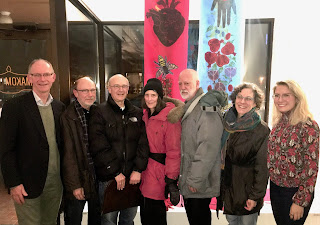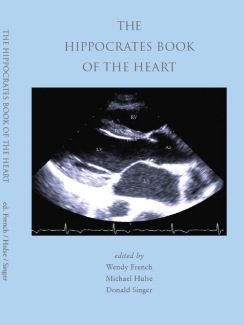The Hippocrates Book of the Heart
Edited by Wendy French, Michael Hulse and Donald Singer
ISBN 978-0-9935911-1-2 UK: £12 Ireland: €15 US: $18 CAN: $24 AUS: $24 NZ: $30
Order a printed copy of the book Order the eBook
Edited by Wendy French, Michael Hulse and Donald Singer
ISBN 978-0-9935911-1-2 UK: £12 Ireland: €15 US: $18 CAN: $24 AUS: $24 NZ: $30
Order a printed copy of the book Order the eBook
Art installation by Rochelle Rubinstein and Alisha Kaplan
This book, made possible by the generous support of the Cardiovascular Research Trust, brings together eighty contemporary poets of the English-speaking world and a dozen medical experts from around the globe to offer their perspectives on the heart.
Since ancient times, the heart has been understood as the seat of the emotions, of the will, even of the soul. Over time, a fuller medical understanding of the organ has gradually evolved too, with Harvey’s first complete account of the circulation of the blood and the heart’s role (1628) and Dr. Christiaan Barnard’s first successful heart transplant (1968) marking key moments in a history that has given us a much better understanding of our hearts – and how to ensure they stay healthy.
In compiling this book, the editors invited poets around the English-speaking world, both prominent and less well-known, to contribute poems about the heart, written from any perspective, whether clinical or fanciful, medical or metaphorical. Among the poets are Griffin Poetry Prize winners Roo Borson and David Harsent, Forward Prize winners Sean O’Brien, Hilary Menos and Nick Mackinnon, former New Zealand Poets Laureate Elizabeth Smither and C. K. Stead, former National Poet of Wales Gwyneth Lewis, and President of PEN International Jennifer Clement. They are joined by many other distinguished and rising poets, including Robert Gray, John Kinsella, Peter Goldsworthy, Stephen Edgar and Geoffrey Lehmann from Australia; Anna Jackson, Jenny Bornholdt and Chris Price from New Zealand; Grace Schulman, Rafael Campo, Matthew Thorburn, Debora Greger and Jeffrey Harrison from the US; Marilyn Bowering and Kenneth Sherman from Canada; Justin Quinn, Mary O’Donnell and John F. Deane from Ireland; and Jane Draycott, Philip Gross, Mimi Khalvati, Lawrence Sail and Penelope Shuttle from the UK.
Leading medical professionals whose practice and research has led them to a keen interest in the health of the heart contribute information and advice to the book. In clear, crisp mini-essays they illuminate the nature of heart disease, the key risk factors, the history of cardiac surgery, and the most important steps every one of us can take in trying to maintain a healthy heart. Our medical professionals, based in Russia, Finland, The Netherlands, France, the UK, Australia and Hong Kong, agree in their core message: maintaining a healthy heart is possible for every one of us, and is crucial to our overall health and well-being throughout our lives.
The result is that rare thing, a book that satisfies the Horatian dictum that writing should both delight and instruct.
The
Canadian launch of the book was held at Makom in Toronto on Thursday
16th November. The programme included readings by Canadian poets Alisha
Kaplan, Kenneth Sherman, Roo Borson and Kim Maltman. There was also a
lively discussion panel on "More poetry: just what doctors and the
public need?" In addition to the above poets the panel was joined by
poet and psychotherapist Ronna and poet and psychiatrist Ron Charach,
with a co-chairs: Alisha Kaplan and Donald Singer.
Ronna
Bloom is the author of 5 collections of poetry including The More
(Pedlar Press, 2017). Her poems have been translated into Spanish and
Bengali, recorded by the CNIB, and used in films, by architects, in
education and health care. Her work appears in "Poetry is Public" and in
the Toronto Public Library Poetry Map. She is currently Poet in
Community at the University of Toronto and Poet in Residence in the
Sinai Health System in Toronto. In these roles she offers students,
health care professionals, patients and visitors opportunities to
articulate their experiences through reflective writing and poetry. A
meditator and psychotherapist, she lives in Toronto.
Roo Borson's work has received the Griffin Poetry Prize and the Governor General's Award. Her most recent book of poetry is Cardinal in the Eastern White Cedar (2017), published by McClelland and Stewart/Penguin Random House. With Kim Maltman, she writes under the pen name Baziju, whose first book, Box Kite, was published in 2016 by House of Anansi Press.
Ron Charach is a poet, essayist, novelist and practicing psychiatrist. Born in Winnipeg, he has lived in Toronto since 1980 with his wife Alice, who is also a psychiatrist and researcher. His medically related poems are featured in two world anthologies of physician poetry published by the University of Iowa Press, Blood & Bone and Primary Care. His most recent books of poetry are Forgetting the Holocaust and Prosopagnosia, the latter of which was published by Toronto’s Tightrope Books. His poetry draws from the twin streams of literature and the healing arts.
Alisha Kaplan: The daughter of a printmaker and a psychiatrist, Alisha is very interested in the convergence of art and medicine, and the healing possibilities of poetry. She is a Torontonian poet, an editor for Narrative Magazine, and the winner of the 2017 Hippocrates Prize in Poetry and Medicine. She taught creative writing at New York University, where she received an MFA in Poetry. Her writing has appeared in Fence, DIAGRAM, Carousel, PRISM, The New Quarterly, and elsewhere.
Kim Maltman is a poet and theoretical particle physicist who teaches mathematics at York University. A past winner of the CBC Prize for Poetry, he has published five solo collections of poetry and three collaborative books, including Introduction to the Introduction to Wang Wei, written under the pen name Pain Not Bread and published by Brick Books.
Born in Toronto, Kenneth Sherman is the author of three books of prose and ten books of poetry. His most recent publications are Wait Time: A Memoir of Cancer and the poetry collection Jogging with the Great Ray Charles.
Donald Singer and Michael Hulse co-founded the Hippocrates Initiative for Poetry and Medicine in 2009. Singer is a clinical pharmacologist who has published over 200 articles, chapters and books on medicines, on cardiovascular research, prevention and treatment, and public understanding of health. He is an editor and contributor to The Hippocrates Book of the Heart (Hippocrates Press, 2017). He co-authors the prescribing safety guide Pocket Prescriber (Taylor & Francis) now in its 8th edition since 2004. He is President of the Fellowship of Postgraduate Medicine. He is also on the Executive Committee of the European Association of Clinical Pharmacology and Therapeutics.
Roo Borson's work has received the Griffin Poetry Prize and the Governor General's Award. Her most recent book of poetry is Cardinal in the Eastern White Cedar (2017), published by McClelland and Stewart/Penguin Random House. With Kim Maltman, she writes under the pen name Baziju, whose first book, Box Kite, was published in 2016 by House of Anansi Press.
Ron Charach is a poet, essayist, novelist and practicing psychiatrist. Born in Winnipeg, he has lived in Toronto since 1980 with his wife Alice, who is also a psychiatrist and researcher. His medically related poems are featured in two world anthologies of physician poetry published by the University of Iowa Press, Blood & Bone and Primary Care. His most recent books of poetry are Forgetting the Holocaust and Prosopagnosia, the latter of which was published by Toronto’s Tightrope Books. His poetry draws from the twin streams of literature and the healing arts.
Alisha Kaplan: The daughter of a printmaker and a psychiatrist, Alisha is very interested in the convergence of art and medicine, and the healing possibilities of poetry. She is a Torontonian poet, an editor for Narrative Magazine, and the winner of the 2017 Hippocrates Prize in Poetry and Medicine. She taught creative writing at New York University, where she received an MFA in Poetry. Her writing has appeared in Fence, DIAGRAM, Carousel, PRISM, The New Quarterly, and elsewhere.
Kim Maltman is a poet and theoretical particle physicist who teaches mathematics at York University. A past winner of the CBC Prize for Poetry, he has published five solo collections of poetry and three collaborative books, including Introduction to the Introduction to Wang Wei, written under the pen name Pain Not Bread and published by Brick Books.
Born in Toronto, Kenneth Sherman is the author of three books of prose and ten books of poetry. His most recent publications are Wait Time: A Memoir of Cancer and the poetry collection Jogging with the Great Ray Charles.
Donald Singer and Michael Hulse co-founded the Hippocrates Initiative for Poetry and Medicine in 2009. Singer is a clinical pharmacologist who has published over 200 articles, chapters and books on medicines, on cardiovascular research, prevention and treatment, and public understanding of health. He is an editor and contributor to The Hippocrates Book of the Heart (Hippocrates Press, 2017). He co-authors the prescribing safety guide Pocket Prescriber (Taylor & Francis) now in its 8th edition since 2004. He is President of the Fellowship of Postgraduate Medicine. He is also on the Executive Committee of the European Association of Clinical Pharmacology and Therapeutics.
















